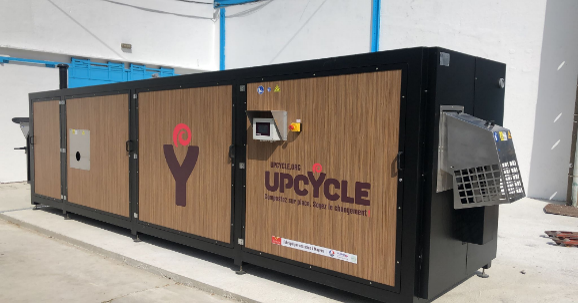Organic waste occupies about ⅓ of urban containers and is essentially composed of water (80%). From an ecological point of view, it is unsustainable to bury it, incinerate it or transport it far away. Composting is a recycling process where bacteria and fungi decompose organic material in an aerobic environment. Organic wastes (in this case livestock mortalities) are transformed by bacteria into a soil-like material similar to humus. Composting in urban areas allows us to manage the waste that we produce in a proximity circuit, encouraging urban agriculture practices, with strong benefits for both our physical and mental health, through an approximation biophilic relationship with nature and the creation of new social bonds.
In 2021, at the warehouse of Banco Alimentar in Lisbon, more than 100 tonnes of organic waste were generated. This waste is divided into two broad categories:
- Organic waste is not usable and;
- Leftovers that are intended for animal feed. The first category
consists of overripe fruit or yellow cabbage that cannot be taken advantage of by the people supported and that, due to their advanced state of deterioration
It also cannot be used on animals. It is currently being put in the trash undifferentiated, having no use.
The project REFEED envisages the installation of a composting equipment that is a closed container which, based on an innovative solution for transforming fruit and vegetable waste, that takes advantage of the heat of decomposition of prodts mixed with wood wast and with a propeller, accelerates composting.
Food Bank is the principal beneficiairy because the majority of the organic waste produced with fruits and vegetable that were directed to wast is composted and reused. Next month we expect to start offering compost to urban gardens.
The impact is very positive; less waste, and the possibility to produce composte that willl be used to produce more food.
Only a society focused on recycling and committed to solving of environmental problems can minimize its environmental impact and contribute to the achievement of an economy that wants more and more circular, in which the natural cycle is closed, which, in this case, begins with the production of organic waste and ends in the backyard with the application of the compound.
The installation of this equipment allows the Food Bank to have zero waste, which is important for achieving its mission. the team of employees and volunteers who dedicate themselves every day are extremely proud of this new equipment
From November we will start delivering compost to community gardens and fruit gardens in prison establishments and we will be able to update this point.
The project allowed the food bank to attract new partners who participated in this sustainability initiative with environmental and social impacts. It was necessary to obtain wood chips, containers to store the compost in production and it has been possible to organize study visits with students to raise awareness of composting and the circular economy.
Some data (Jun/August/september 2023):
Fruits and Vegetables compostedt: 7,28 ton
Compost produced/in production: 3,64 ton
Compost available to distibution: 1,2 ton




